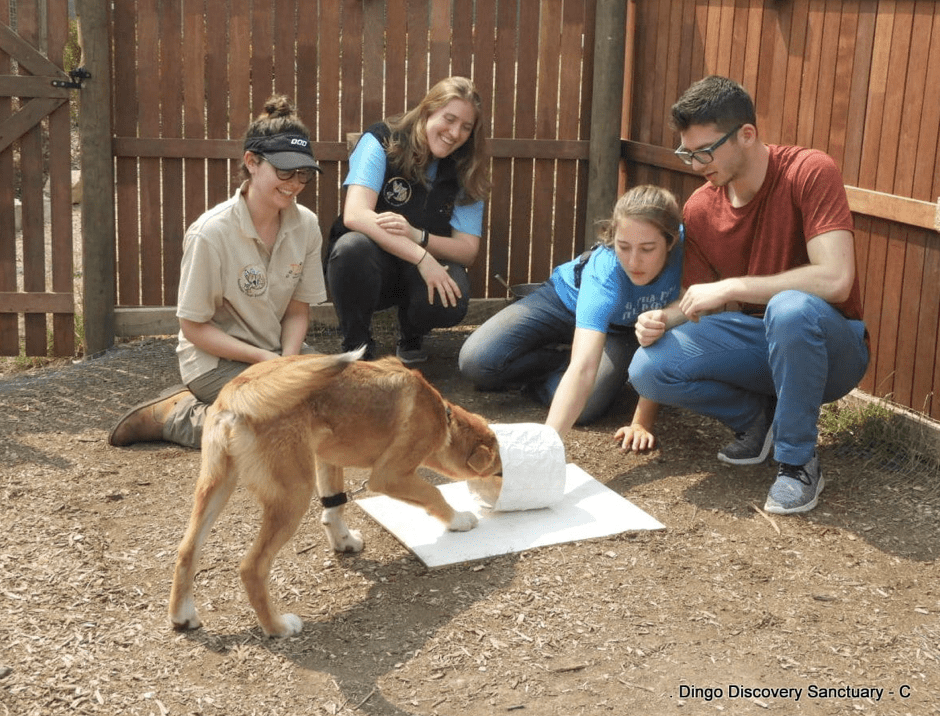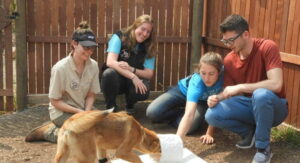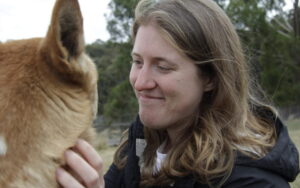
OUR RESEARCH QUESTIONS
How do dogs think and see the world?
We seek to understand how dogs see the world. Dogs are an important part of human life, which is why it’s shocking that we know so little about their psychology. The BC Dog Lab taps into dogs’ minds using fun puzzles that let us observe their behavior. We’re particularly interested in understanding how dogs learn from their human friends. Long term we seek to support service and working dog training, human-dog bonds, and the pet welfare.
Has domestication changed dog behavior?
Domestication, in the animal cognition space, is used to describe an evolutionary process by which animals experience selection pressure for tameness. Selection pressure is a term used to describe an environment’s impact on an animal’s chances of survival. Scientists have noticed a strong correlation between domestication and certain behavioral and physiological traits that seem to impact dogs and all other domesticated animals. We compare the cognitive abilities of domesticated canids like dogs and dingoes (Australia’s wild, undomesticated canid) to the cognitive abilities of wolves to better understand how domestication has impacted canid thinking abilities. Why is this important? Because there’s evidence that humans have been domesticated too!
What does dog behavior say about humans?
We study dogs to understand humans. There is evidence that humans and dogs share something special — both of us have undergone domestication. As mentioned in the previous paragraph, domestication is a process that has anatomical and behavioral consequences for a species’ social behavior. Because both dogs and humans have undergone domestication, we can study dogs to better understand how humans’ complex behavioral ecology evolved.
OUR PUBLICATIONS
Peer Reviewed Publications
Pelgrim, M.H., Tidd, Z., Byrne, M. et al. Synchronous citizen science with dogs. Animal Cognition 27, 46 (2024). https://doi.org/10.1007/s10071-024-01882-6
Byrne, M., Sawyer, K., & Johnston, A. (2024). Still face in pet dogs (Canis familiaris). Journal of Comparative Psychology. https://doi.org/10.1037/com0000371
Project, M., Espinosa, J., Bray, E., Buchsbaum, D., Byosiere, S., Byrne, M., … Zipperling, L. (2021, July 12). ManyDogs 1: A Multi-lab replication study of dogs’ pointing comprehension (pre-registered report). https://doi.org/10.31234/osf.io/f86jq
Byrne, M., Horschler, D.J., Schmitt, M. et al. Pet dogs (Canis familiaris) re-engage humans after joint activity. Anim Cogn 26, 1277–1282 (2023). https://doi.org/10.1007/s10071-023-01774-1
Bogese, M. J., Johnston, A. M., & Byosiere, S.-E. (2024). Gaze in cats (Felis catus) and dogs (Canis lupus familiaris). Journal of Comparative Psychology, 138(1), 68–76. https://doi.org/10.1037/com0000359
Bray, E., Otto, C., Udell, M., Hall, N., Johnston, A. M., & MacLean, E. (2021). Enhancing the selection and performance of working dogs. Frontiers in Veterinary Science, 8, 644431. PDF
Pelgrim, M., Espinosa, J., Tecwyn, E, Marton, S., Johnston, A. M., Buchsbaum, D. (2021). What’s the point? Domestic dogs’ sensitivity to the accuracy of human informants. Animal Cognition, 24, 281-297. PDF
Silver, Z., Furlong, E., Johnston, A. M., & Santos, L. R. (2021). Training differences predict dogs’ (Canis lupus familiaris) preferences for prosocial others. Animal Cognition, 24, 75-83. PDF
Byrne, M., Bray, E., MacLean, E., Johnston, A. M. (2020). Evidence of win-stay-lose-shift in puppies and adult dogs. Proceedings of the Cognitive Science Society. PDF
Royka, A. L., Johnston, A. M., Santos, L. R. (2020). Metacognition in canids: A comparison of dogs (Canis familiaris) and dingoes (Canis dingo). Manuscript in press at the Journal of Comparative Psychology. PDF
Johnston, A. M., Byrne, M., & Santos, L. R. (2018). What is unique about shared reality? Insights from a new comparison species. Current Opinion in Psychology, 23, 30-33. PDF
Johnston, A. M., Huang, Y., & Santos, L. R. (2018). Dogs do not demonstrate a human-like bias to defer to communicative cues. Learning & Behavior, 46(4), 449-461. PDF
Johnston, A. M., Holden, P. C., & Santos, L. R. (2017). Exploring the evolutionary origins of overimitation: A comparison across domesticated and non-domesticated canids. Developmental Science, 20(4), e12460. PDF
Johnston, A. M., Turrin, C., Watson, L., Arre, A. M., & Santos, L. R. (2017) Uncovering the origins of dog-human eye contact: Dingoes establish eye contact more than wolves, but less than dogs. Animal Behaviour, 133, 123-129. PDF
Johnston, A. M., McAuliffe, K. & Santos, L. R. (2015). Another way to learn about teaching: What dogs can tell us about the evolution of pedagogy. Behavioral and Brain Sciences, 38, e44. PDF
Other News

Are Dogs as Smart as We Think?
Dr. Johnston was recently featured in an article entitled “How Stupid are Dogs, Really?” along with some of her colleagues from the field of dog cognition. This interesting article covers some of the misconceptions people tend to have regarding canine…

Dingo Research
Lab members Dr. Johnston and Molly Byrne just spent two wonderful weeks at the Dingo Discovery and Research Sanctuary just outside of Melbourne. They were able to collaborate with Zach Silver from Yale on several new studies with the fascinating dingoes. For more on…

Sporting Dog Talk Podcast
Our primary investigator, Dr. Angie Johnston, was recently invited to be a guest on the Sporting Dog Talk Podcast. In episode 63, she and the hosts discuss topics about canine communication including its evolution and what it means for owners. Check out the episode…
